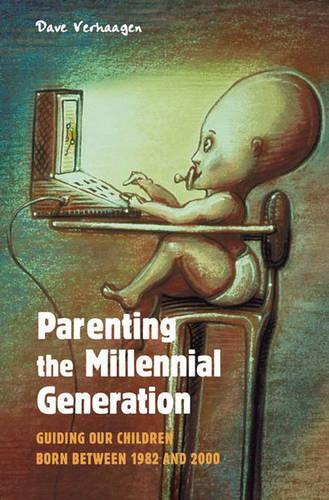
Parenting the Millennial Generation: Guiding Our Children Born between 1982 and 2000
(Hardback)
Publishing Details
Parenting the Millennial Generation: Guiding Our Children Born between 1982 and 2000
By (Author) David Allan Verhaagen
Bloomsbury Publishing PLC
Praeger Publishers Inc
30th October 2005
United States
Classifications
General
Non Fiction
Sociology: family, kinship and relationships
649.1
Physical Properties
Hardback
180
Width 156mm, Height 235mm
425g
Description
They have strong valuesfaith, family, tolerance, intelligence, and altruism among them. But, contrary to what one might guess, these people are not America's sage elders. This is the Millennial Generation. Born between 1982 and 2000, the oldest among them today are entering their 20s or in their teen years. They aim to rebel against society by cleaning it up, returning to old-fashioned values and relationships. Author Verhaagen describes why, nonetheless, parents are feeling more anxious and frazzled than ever before, even as they are faced with the task of raising what some predict will be our next hero generation. Verhaagen explains how research shows adults can help keep these young people on a positive path, stoke their ideals, and help them be resilient when the inevitable mistakes and obstacles arise. The Baby Boomers and older Gen Xers are parenting this new crew, aiming to ground them and instill great hope for the future. But Millennials face challenges greater than any generation faced before them. Many spend all or part of their childhood without a father in the home. Technology, including the Internet, is exposing them to adult material at increasingly young ages. They are subject to violent images that are more common than ever before in movies, television, and games. So parents still need to provide guidance. Verhaagen aims to help parents with research and advice, including how to teach determination, problem-solving, emotional smarts, and resilience. His text includes vignettes and his personal experience as a psychotherapist/father.
Reviews
Identified in the popular press as the biggest generation in the US since the baby boomers, the millennial generation (born 1982-2000) is said to be heir to a culture that has come to its senses and realized that children need guidance, nurturance, and limits. Integrating popular literature with current and established research, Verhaagen (a practicing psychologist) presents a summary of the characteristics of this group of children; he uses classic research on parenting from the 1960s to identify characteristics of those best suited to parent this new group. Verhaagen argues that parents need to consider the whole child rather than focus strictly on issues that need to be changed, and that increasing strengths and building on a child's strong points--rather than worrying about risks or problems--is more likely to result in positive outcomes.Verhaagen provides concrete examples of what parents can do to enhance the strength of each protective factor. Though undergraduates may enjoy reading about their supposed profile, this is essentially a guide for professionals and parents. Recommended. Professionals; general readers. * Choice *
Author Bio
Dave Verhaagen is a licensed psychologist and a managing partner with Southeast Psychological Services. He has served as the clinical director for three mental health agencies that serve children, adolescents, and their families. He is a nationally recognized speaker and the author of five books.
